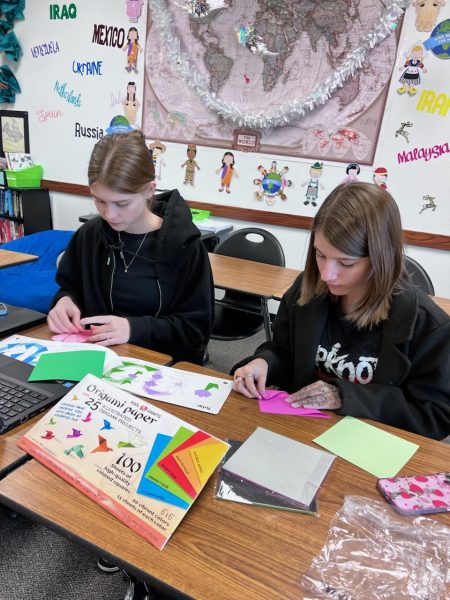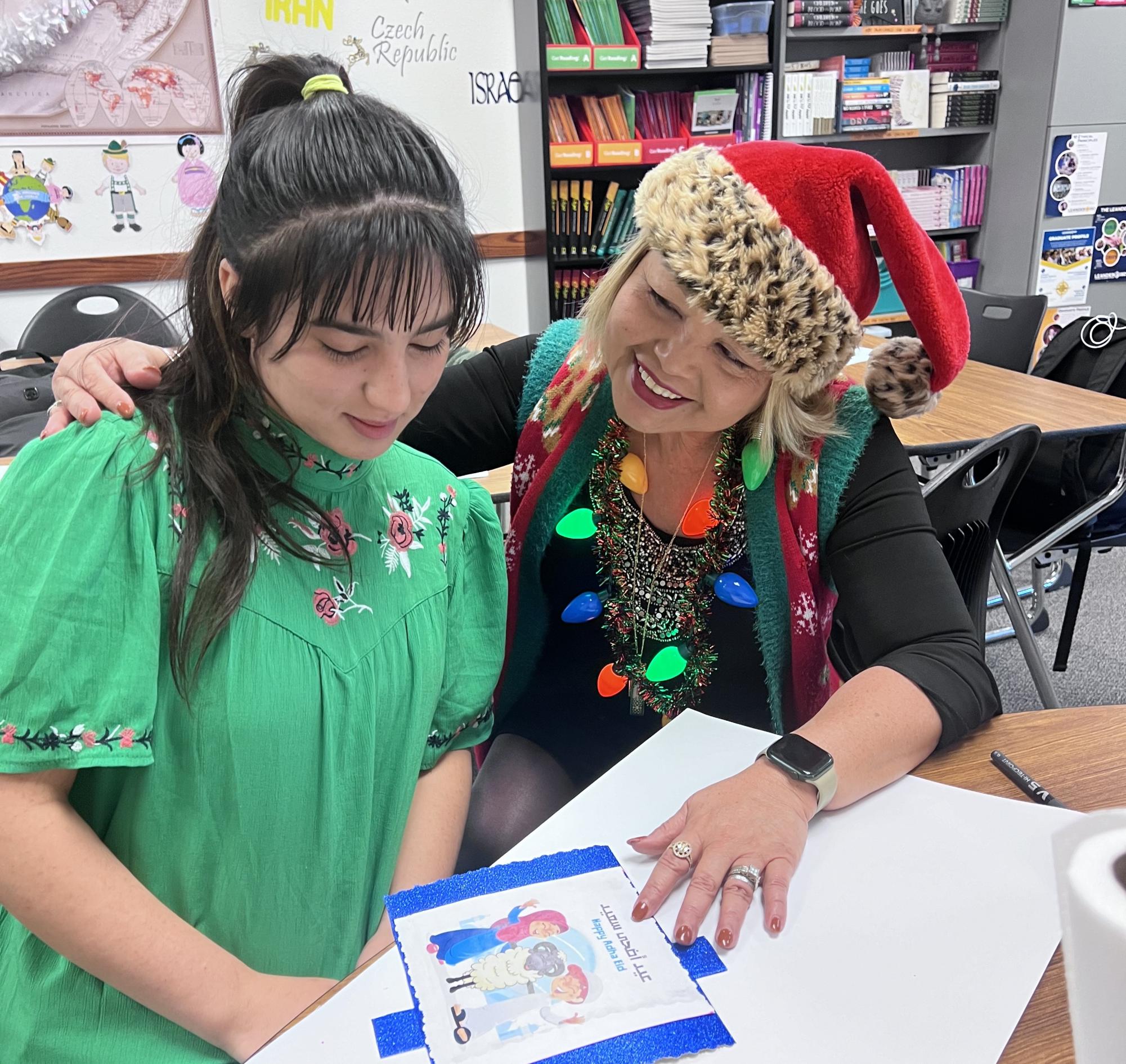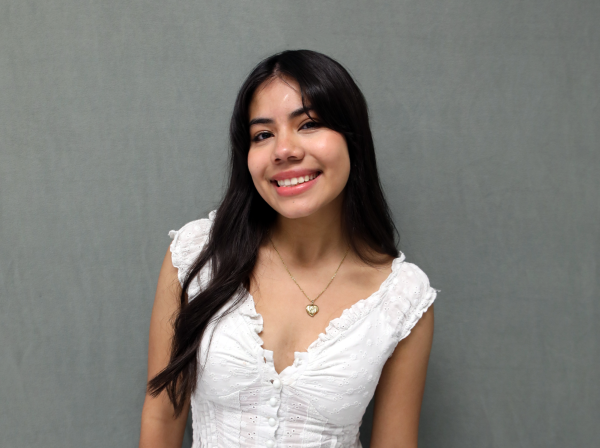Ecstatically looking for their flags, students from all around the globe gathered around the classroom tables. Though they come from different countries and experienced different cultures, one thing unites them: the pursuit of mastering the English language.
The English Second Language (ESL) program at the school offers students a place to expand their knowledge of English throughout the year and provides them with a safe environment to navigate high school and build a community of their own.
“When [students] walk through this class, they feel safe and comfortable, because they feel like they have found a family outside of their own family, a home away from home,” ESL teacher Mi
ma Nazarene said. “In a sense, this class helped them to build an ESL family that builds back their confidence [and] fills their soul with happiness.”
Nazarene has focused on creating a welcoming environment in her classroom and encouraging students to practice English by speaking with self-assurance.
“[Students] found people that speak different languages and we all have accents here. So, it helps build [their] confidence,” Nazarene said. “I want my children to learn ‘do not be afraid to be who you are and not be embarrassed [of] your accent. When you have an accent, you have another language.”
Nazarene herself has expressed how her accent has never discouraged her from seizing opportunities in her teaching journey.
“I have been stereotyped because of the color of my skin and my accent. I was once asked, ‘How could you teach English as a Second Language when you have an accent?’ This question has stuck with me through all these years,” Nazarene said in an interview with Leander ISD Chief of Diversity, Equity, and Inclusion DeWayne Street. “Instead of feeling offended, the question fueled my desire to show people my heart through my work. My students became my legacy through the opportunities they have been able to pursue despite being from other countries.”
In ESL, students who come from different countries and are not familiar with the language can find a community to aid them in mastering the language.
“We had to move really quickly because of the war in Russia,” sophomore Alina Grechishnikova said. “[When] I first came here, I did not speak English at all. At first, I was struggling with English, so Ms. Nazarene helped me know the language and start to speak more.”
The program focuses on accelerating the speed at which students learn English, often incorporating activities such as journaling, vocabulary learning, or reading books of their preference.
“I learned English like [in] a regular English class,” sophomore Audrey Rodriguez said. “I’ve learned a lot of things, and being around people that are also learning the language is good because then you learn new things that maybe you didn’t know.”
ESL students work through their language-learning journey, sometimes even learning the language within a short period of time, spanning from a year to even just a few months.

“The best part is when they come in August [and] they cannot speak a word of English and [use] Google Translate, [but] by May, they are talking very fluently,” Nazarene said.
Nazarene has ensured to build students’ language proficiency and provide them with individual learning experiences in order to give them the skills necessary to advocate for themselves.
“When I teach English as a second language I look at ‘What’s your proficiency level? Where is your level right now?’,” Nazarene said. “This is very important, because not everybody is a cookie cutter. So [I tell them] ‘Don’t be embarrassed, don’t be afraid to keep trying, and don’t be afraid to speak and advocate [for] yourself.’ That’s the gist of my program.”
Aside from providing opportunities to improve their knowledge of English, students can have the opportunity to meet other students who have had similar experiences.
“Meeting new people that [are] also from other countries is very comforting because they have passed through the same situations as me,” Rodriguez said. “We have the same feeling of missing our country and wanting to go back. So having those people here is very comforting. It makes you feel like you’re in a safe place.”
Cultural celebrations where students can learn more about each other’s traditions can sometimes be seen in the ESL classroom. Nazarene hosted the Cultures Day Celebration in October and will host a Chinese New Year celebration in January.
“In this room we celebrate different kinds of culture[s],” Nazarene said. “[In] cultural celebrations they all come together as a family. I’m not a person who could travel everywhere in the world, but I’m blessed in a sense that all the world comes to me. I have [students from] Afghanistan, Iran, Israel, Guatemala, Costa Rica, and Brazil. The children teach me a lot about their different cultures, and they learn a lot about me.”
ESL classes also give students who are new to the school or even the country the opportunity to connect with others in the same situation.
“Helping new kids that are from other countries find their own voice – their own safe space – is very good,” Rodriguez said. “It’s not the same thing If I just got to the country and I went to talk to an American kid that already has their friend group as to someone who also just got here and empathizes with what I’m feeling right now.”
The ESL program especially focuses on providing students with a platform to share their feelings and their story, as well as finding a community of their own.
“I run the class like a family; this is my ESL family,” Nazarene said. “When a child walks through the door, they are an individual. It matters to me where they come from. The first thing I do when a student walks through the doors is [ask them] to write their story. Why are they here? What made them come? What happened to them? So I really encourage [others] to come in, find out how my program is, and talk to me in person. Give me a try, because I really will look at the kid first. It has been a beautiful experience and I really love my job. I really do.”





Medineh • Dec 18, 2023 at 7:06 pm
We are proud of you sir, keep it up?